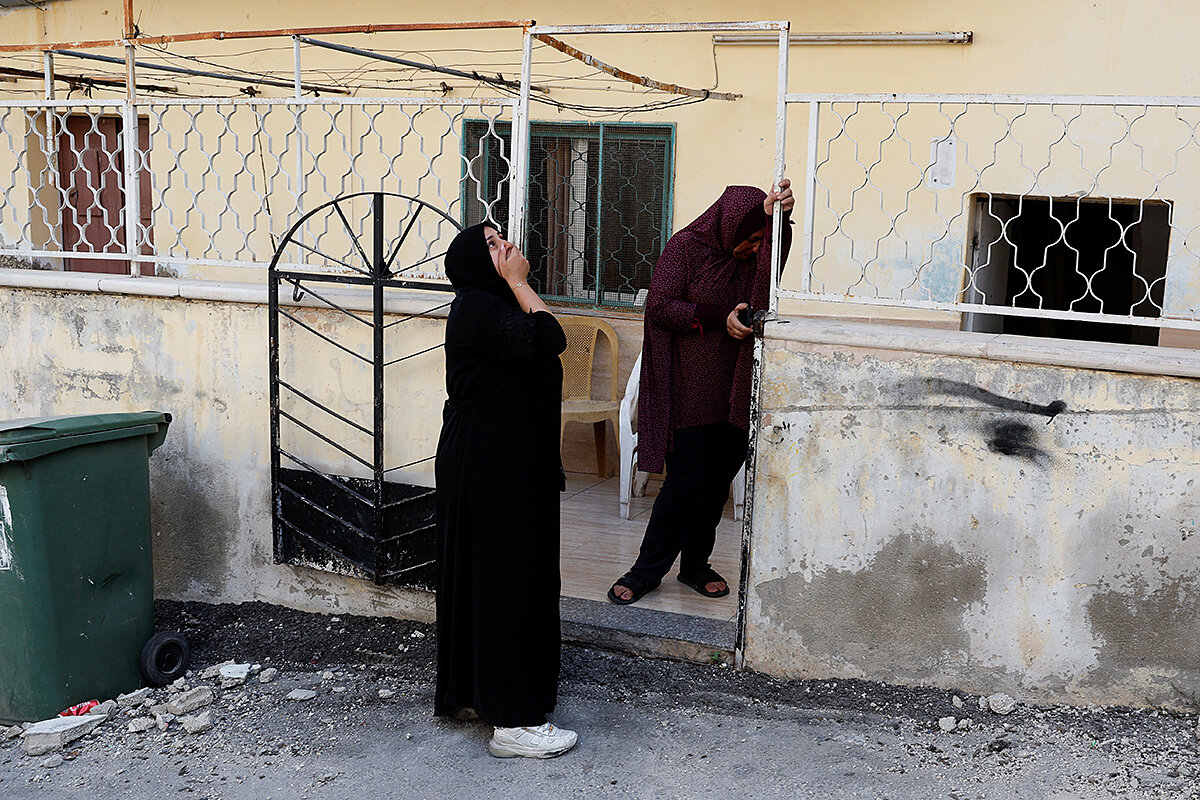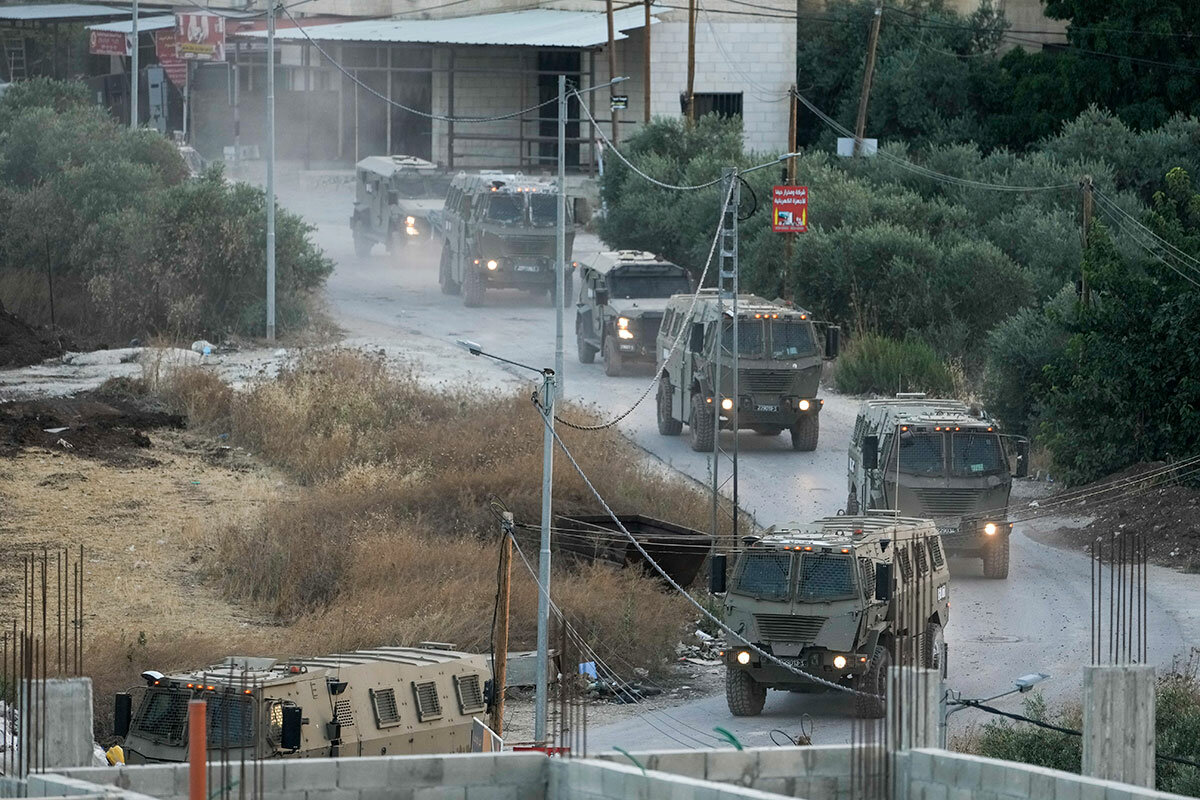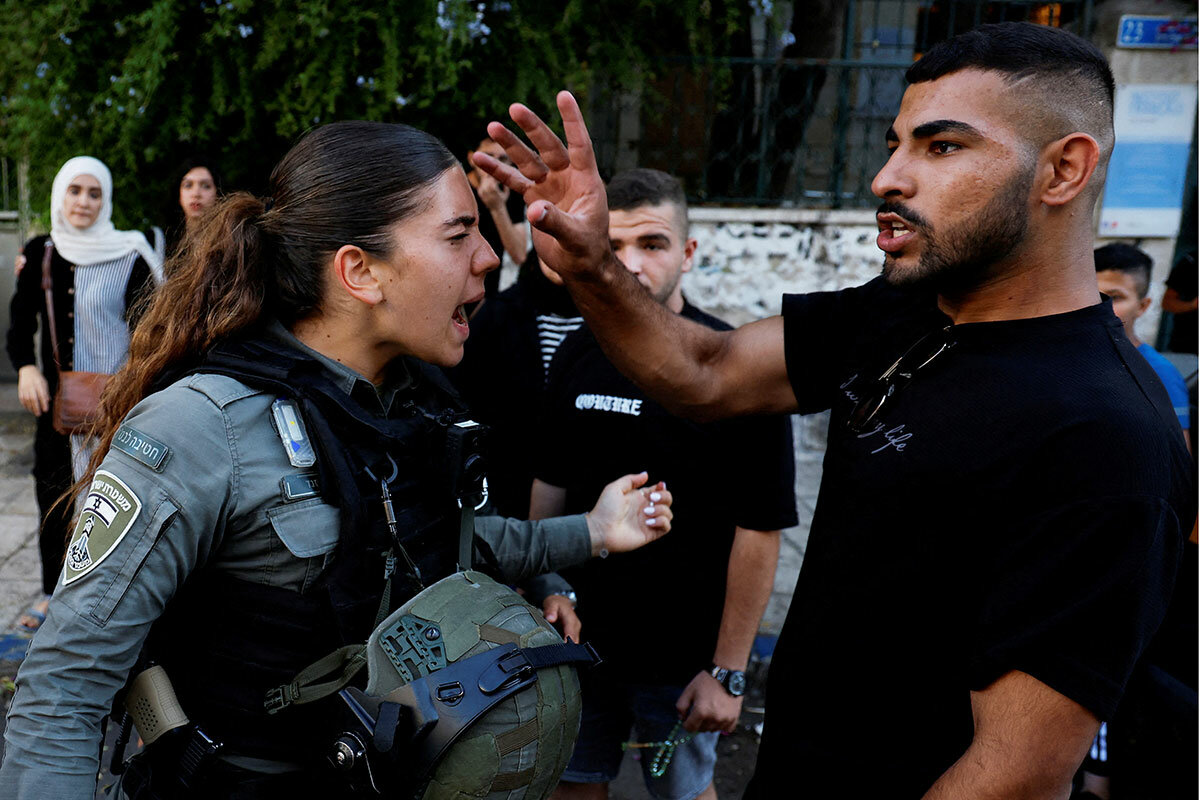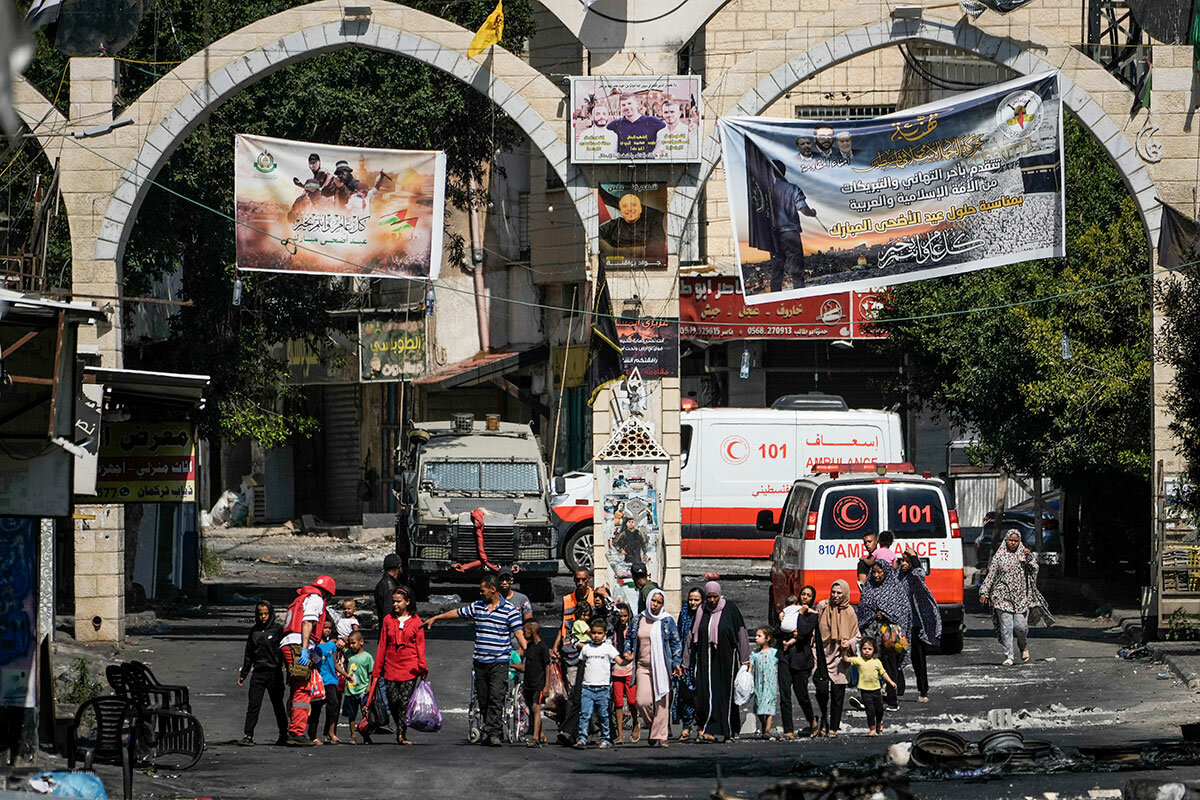For two days Israel targeted militants in Jenin. What did it achieve?
Loading...
| TEL AVIV, Israel; and RAMALLAH, West Bank
Israel’s 48-hour incursion of hundreds of troops this week into the northern West Bank city of Jenin, which has emerged as a potent stronghold for Palestinian militant groups, left behind some telling images. What they promised for the future was not security for anyone, but escalation and a deadly cycle of violence that evoked comparisons among some observers to Gaza.
Families are now returning to smashed homes and rubble-strewn streets left by receding Israeli forces after their largest incursion into the West Bank in two decades. The raid displaced thousands of residents from the targeted refugee camp, with more than 140 injured.
Why We Wrote This
A story focused onIn the name of security, Israel has fought Hamas again and again in Gaza. Now, the largest Israeli incursion in the West Bank in two decades, targeting popular young militants in Jenin, seems to be paving the way only for more clashes.
At a funeral Tuesday for some of the dozen young militants killed in the battle, angry mourners chased away two Palestinian Authority representatives who arrived to express their condolences.
“In the short term [the operation] may change things a little – degrade the local capabilities of the militants,” says Amos Harel, defense analyst for Haaretz newspaper. “But even the most optimistic officials and analysts admit [that the operation] doesn’t change things fundamentally.”
Palestinian morale remains high. “The most important thing was the camp fought back,” says Alaa Salah, whose house was destroyed. “What matters is that the shabab [militants] survived and are safe.”
Israel’s 48-hour incursion of hundreds of troops this week into the northern West Bank city of Jenin, which has emerged as a potent stronghold for Palestinian militant groups, left behind some telling images.
What they promised for the future was not security for anyone, but escalation and a deadly cycle of violence that in recent years had been alien to the once-stable West Bank and that evoked comparisons among some observers to Gaza.
They also highlighted the increasing irrelevance and ineffectiveness of a Palestinian Authority caught between growing support for armed groups at home and an intransigent far-right government in Israel.
Why We Wrote This
A story focused onIn the name of security, Israel has fought Hamas again and again in Gaza. Now, the largest Israeli incursion in the West Bank in two decades, targeting popular young militants in Jenin, seems to be paving the way only for more clashes.
Families are now returning to smashed homes and rubble-strewn streets left by receding Israeli forces after the largest Israeli military incursion into the West Bank in two decades. The raid displaced thousands of residents from the targeted refugee camp, with more than 140 injured.
At a funeral Tuesday for some of the dozen young militants killed in the battle, which involved Israeli drone strikes and ground forces, angry mourners chased away two senior Fatah and Palestinian Authority (PA) representatives who arrived to express their condolences.
Palestinian protests also erupted against the PA and its aging autocratic ruler Mahmoud Abbas over its inability to protect citizens from increased settler attacks and its alleged facilitating of Israeli military operations.
“We are talking about devastated families and households who are in need of more than just diapers and canned foods. We need to feel safe,” says Saja Bawaqneh, a 30-something lawyer whose family home in Jenin was damaged by Israeli forces for the second time in less than a year. “Over the past few years, we haven’t felt safe in our homes at all.”
And Israeli military officials admitted that despite its devastating scope, the large-scale operation had fundamentally changed little on the ground and was likely just a prelude for future military action.
Israel launched the long-anticipated raid after months of deadly militant attacks – many emanating from the Jenin region – and escalating Israeli-Palestinian violence that has claimed the lives of more than 160 Palestinians and 20 Israelis this year alone.
Declaring that Jenin was “no longer a safe haven” for militant activity, Israeli Prime Minister Benjamin Netanyahu hinted Wednesday at further West Bank military operations.
“This is just a first step. It’s not, by any means, the last action that we will take,” Mr. Netanyahu said at the conclusion of the operation.
A retaliatory car-ramming and stabbing attack on Tuesday by a Palestinian in Tel Aviv that injured seven, and the killing of an Israeli soldier by a Hamas gunman in the West Bank on Thursday, hit home for many that this week’s destruction in Jenin was a prelude to more confrontation and bloodshed, not less.
To fight another day
The focus of the Israeli operation was the Jenin Brigades, a militant network formed in 2021. Like the Lions’ Den in Nablus, it is a grouping of young men from a cross section of Palestinian factions and backgrounds united by their desire to raise arms against Israel.
According to one senior Israeli military officer, the intent of the operation was to dismantle the “terrorist activities and infrastructure” inside the 0.16-square-mile camp of 23,000 people, as attested by the myriad explosive devices and weapons caches Israel seized.
Another major aim was to “increase our freedom of operations into the camp,” the Israeli military official said. Heavily armored bulldozers tore up streets looking for buried improvised explosive devices lying in wait.
Yet Israeli officials admitted that most of the hundreds of armed militants estimated to be inside the Jenin camp simply dispersed at the launch of the operation.
Israel estimates that 13 armed combatants were killed in the two-day operation along with one Israeli soldier whom sources say was possibly killed by friendly fire. Palestinian health officials say Israeli forces killed 12 people, including four teenagers.
“In the short term [the operation] may change things a little – degrade the local capabilities of the militants … allow the [army] greater freedom of movement, so not every raid into Jenin will turn into ‘Black Hawk Down,’” says Amos Harel, defense analyst for Haaretz newspaper.
“But even the most optimistic officials and analysts admit [that the operation] doesn’t change things fundamentally and could trigger more revenge attacks in the West Bank, from Hamas in Gaza, or Hezbollah in Lebanon,” he adds.
The ability of the Jenin Brigades to disperse, regroup, and live to fight another day undermined Israel’s second and perhaps greater goal: “to dismantle the heroic image of Jenin camp” – as the Israeli officer said – in the minds of the Palestinian public as a bastion of resistance.
Instead, the operation has cemented support for Jenin and its armed groups among Palestinians in both the West Bank and Gaza.
With PA forces unable to stop armed far-right Israeli settlers from marauding in Palestinian villages, residents are increasingly turning to these militant groups as the only actors defending Palestinian lands and homes – even as they remain wary of the prospect of a wider conflict and the proliferation of armed groups.
Political aims
Israeli analysts say the operation did more to further the political goals of the Israeli government: It allowed Prime Minister Netanyahu to appear tougher on security than the previous government, and it advanced the agenda of his far-right settler coalition partners, who wish to expand and secure their presence in the West Bank.
“The settlers ... want to exert their new influence on this government, and their ultimate aim is to destroy the Palestinian Authority,” says Mr. Harel. “An Israeli incursion like this, they know, will weaken it even further.”
Indeed, the ability of Jenin’s militants to withstand a major ground operation and drone strikes two weeks after they bogged down Israeli armored vehicles in the mazelike camp for several hours has cemented a Palestinian narrative of a David versus Goliath struggle. That narrative is winning support and plaudits for the armed groups even among Fatah officials and Ramallah politicians who advocate nonviolent means to statehood and the end of Israel’s occupation.
“This is a chance for us to raise our heads up high, even when we cannot openly support them with arms,” says Mohammed, a senior Fatah member in Ramallah.
Some of the estimated 4,000 civilians pushed from their homes by fighting are returning to destruction and deteriorating services in Jenin.
Torn-up roads have hindered the access of ambulances, and electricity and water services have been disrupted throughout the refugee camp.
The closure of United Nations Relief and Works Agency health facilities and schools, ATMs, banks, and shops that honor U.N. food assistance vouchers has exacerbated the situation for thousands of residents who were already vulnerable and skirting the poverty line before the incursion.
The U.N. relief agency said it was working to support Palestinian authorities to restore basic services, reopen schools, and provide cash assistance.
“Spirits are high”
Yet morale, even among families that lost homes, remains high.
Alaa Salah, a 20-something camp resident who was reached by phone and whose house was entirely destroyed, says that “the most important thing was the camp fought back.”
“My home is damaged, my brother and cousin are injured, and my mother is now living with our relatives, but our spirits are high. What matters is that the shabab [militants] survived and are safe,” he says from Jenin. “These men are real men; they protected us when no one could, not the PA or any other faction. [Palestinian factions] are all useless and it is now all in the hands of the resistance.”
Ms. Bawaqneh, the lawyer, whose father was killed by Israeli forces in a Jenin raid last year, said the operation has deepened a sense of insecurity across the West Bank.
Yet she says Jenin residents have taken heart in the fact the operation has “united” diverse Palestinian factions who offered moral support for the Jenin Brigades.
“United on the battleground, they are giving us a sense of hope that we are protected,” she says.
The PA this week said it broke off communication and security cooperation with Israel in protest over the raid, yet it has not lessened the view among Palestinians that it has facilitated such operations.
Despite Mr. Abbas’ insistence on negotiations as the only viable path out of the conflict, there is neither political will in Israel nor in the United States and the international community to restart talks, Palestinian analysts say. And that too is fueling support for resistance.












